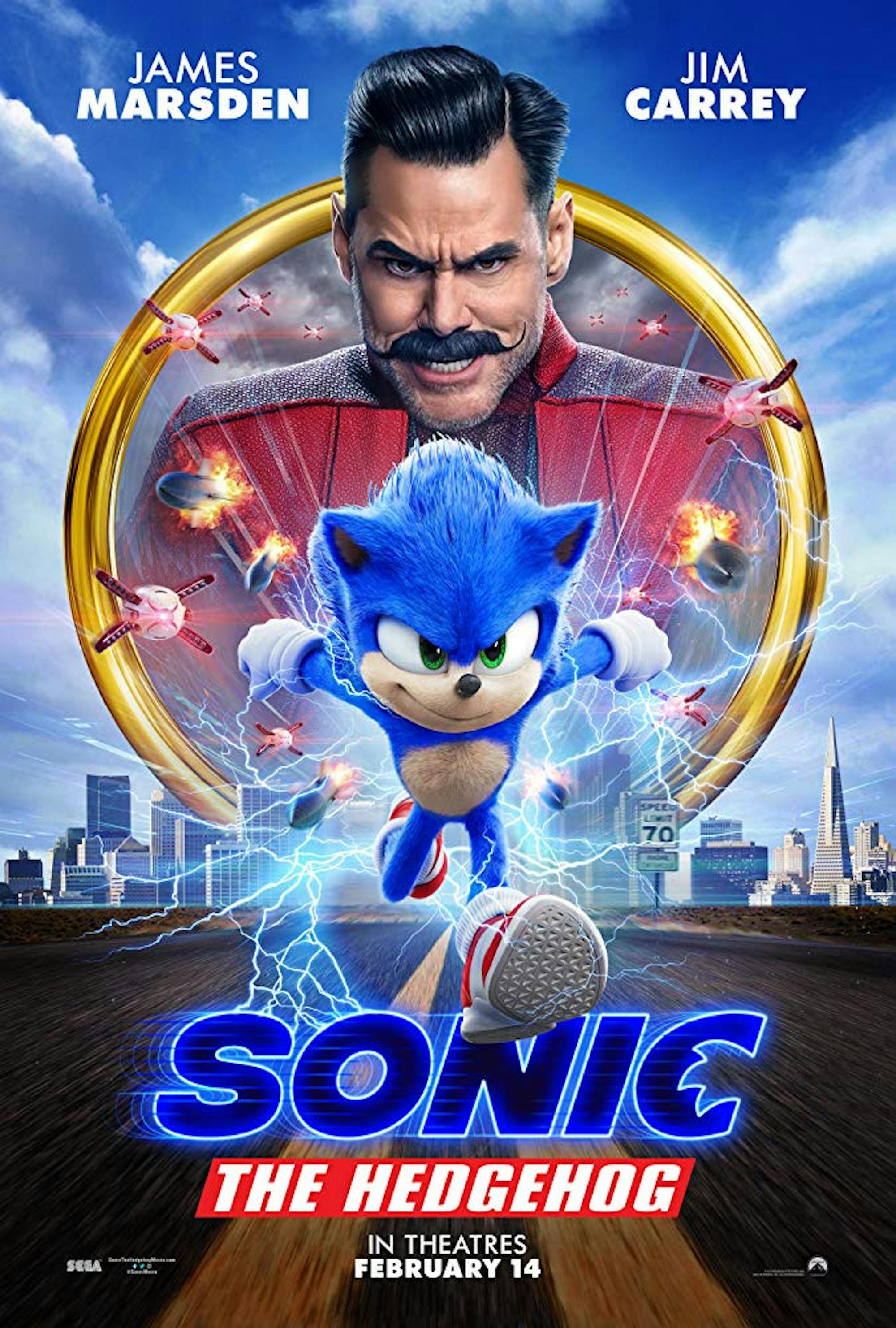During the pre-title sequence of the new film “Sonic the Hedgehog” (2020), the protagonist is told by his mother figure that he must “never stop running” from those who would hurt him to harness his super-speed. Over the next 90 minutes, you realize that that’s the whole point: trouble finds Sonic because he can run very fast. The film’s Big Bad is just mustachioed danger for danger’s sake. It feels somewhat lazy. You feel somewhat disappointed.
That feeling pretty much encapsulates the experience of watching “Sonic the Hedgehog,” a movie whose cultural relevance precedes its content. The movie first generated buzz outside of gamer circles following controversy over the titular hedgehog’s nightmarishly anthropomorphized animation. The original poster for the film, which featured proto-Sonic’s grotesquely muscular man-legs, sparked initial outrage from everyone and their mother, including Yuji Naka, who was literally the lead programmer on the team that made the original “Sonic the Hedgehog” game series. Oof.
The outcry reached a fever pitch when the film’s first trailer went live on April 4, 2019. It unveiled now-infamous images of what could easily have been a taxidermied fursuit slicked with hair gel, complete with blank, glassy eyes and mouth full of human teeth. Superfans of the franchise had a host of other issues with the film, including the pandering tagline and Sonic’s blue arms, but the animation drowned out the voice of all other grievances. Folding like a card table under the weight of universal ridicule, Paramount Studios offered fans a mea culpa in the form of a delayed release and a bottom-up redesign of Sonic’s character. On Nov. 12, the studio released a new trailer featuring a revamped cartoonish Sonic and all was well. (Claims that the studio staged the controversy to raise the film’s public profile have been largely debunked.)
Despite (or more likely because of) its much-memed pre-release teaser material, the movie has enjoyed tremendous success at the box office, raking in an impressive $70 million during its first four days in theaters. It thus beats the opening weekend box office record for a film based on a video game, which had been set last year by the objectively superior “Detective Pikachu” (2019).
This brings us to the subject at hand. “Sonic the Hedgehog” presents the story of Sonic (Ben Schwartz), a rapid gem-toned kid hedgehog growing up on the island of Mobius under the wing of an archetypically protective owl-mother. After a plot device forces him to flee his beloved home, he ends up in the small town of Green Hill (get it?). There he meets good cop Tom Wachowski (James Marsden), a bored man with a good heart and a cool wife. The two team up to fight and ultimately defeat Dr. Robotnik (Jim Carrey), who was hired by the U.S. military to investigate the mysterious power outages caused by Sonic’s antics, but who really intends to do evil science on him.
As a whole, the film is inoffensive. Schwartz is charming and predictable as Sonic, breathing comedy at reasonably regular intervals into a mostly cardboard script. Marsden did the best he could with what he was given. Carrey’s Dr. Robotnik carries himself as most of his characters do, and as one can only imagine the actor himself does in private moments. The second-round animation looks undoubtedly better than the original would have — that is, extended exposure to this Sonic’s countenance won’t conjure a poltergeist to follow you home from the theater. The movie is not challenging, and it is not bad.
That’s not to say it isn’t disappointing. The thing about video game movies (and TV shows, which seem to be all the rage nowadays what with the recent success of "The Witcher" (2019–) on Netflix and the release of "Castlevania" (2017–) season three slated for Thursday) is that they aspire to channel a small, dedicated subculture into a universally beloved franchise. Big budget productions like “Sonic the Hedgehog” and “Detective Pikachu” promise the keepers of these cultural milestones their day in the sun in exchange for the protective aura of a passion project. Actors perform media stunts averring their video game bonafides not to win the trust of superfans, but because catering to superfans makes them and their product look genuine. It’s a shame this movie didn’t turn out better, if only for the sake of the people to whom it actually mattered.
'Sonic the Hedgehog' stays out of fast lane

A promotional poster for "Sonic the Hedgehog" (2020) is pictured.





